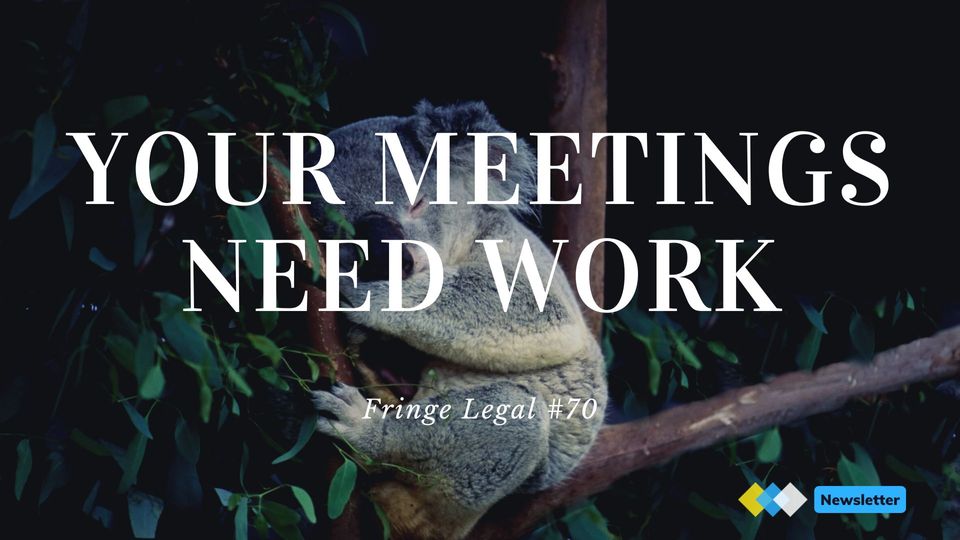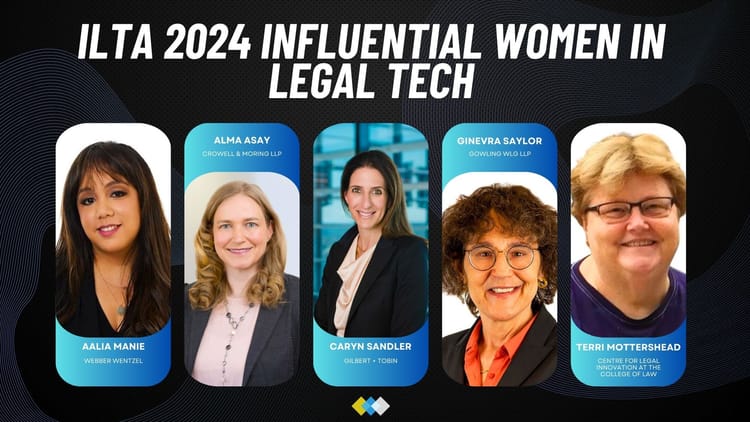Fringe Legal #70: your meetings need work

Do you have recurring meetings in your calendar? Perhaps they are one-to-ones, team huddles, or board meetings.
Now think back to each of those meetings:
- Are they productive meetings?
- Would you enjoy your role more if that meeting didn’t happen?
Over 70% of meetings are unproductive (the statistic is the same in 2017 and 2021). Most are not run well and are a huge cause of burnout and lack of engagement.
70% of all meetings keep employees from working and completing their tasks
Meetings aren't going away, and I’m not suggesting they do. However, there are some better ways to run them.
Here are 5 ways I’ve seen that result in positive outcomes (a more engaged workforce):
4 ideas that are easier to implement:
- Shorten the duration of meetings or end them early. (Note shorter meeting does not mean more of them!)
- Reduce the list of attendees - do all 53 people need to be on the call!?
- Define the purpose of the meeting - if it’s just sharing information then record and let people catch up asynchronously. If it's a discussion (see slightly controversial idea below).
- Have a meeting-free day, or set boundaries that create space to do deep work e.g. no scheduled internal meetings after 1pm on any day.
A slightly more controversial idea
- Make memos a requirement for meetings requiring a discussion
Memos > presentations
Memos are significantly better than presentations. Why?
- Memos take the showmanship of the presentation out of the equation and force a deeper evaluation of the topic.
- Memos level the playing field - the presenter and some of the audience may have familiarity with the topic, which is taken for granted in a presentation.
A memo generally provides background information and an overview. It allows for:
- a balanced approach - anyone being added late to the discussion to get caught up
- more collaboration - those without the loudest voice or more junior members to ask questions
- clarity - there is nothing implied or lost over broken Teams/Zoom audio.
Memos don't work for every meeting, but where a thoughtful discussion is required spending the time upfront on this kind of presentation may be well worthwhile.
Amazon has used it successfully for its leadership meetings with phenomenal success. (see dig deeper section).
Lastly, it's worth remembering that being able to run a meeting well is a skill. But sadly like many important professional skills, it is often taken for granted. Being mindful, aware, and spending the time to improve is well worthwhile.
Want to dig deeper?
The A16Z Podcast shares insight into Amazon. Including details on running memo-led meetings, working backwards from releases and more. Listen here.
The memo by Roelof Botha of Sequoia proposing an investment into YouTube is epic.
Around the web 🔗
Open Cap Table releases v1 of its format: win for standardization. What’s interesting is the “innovative collaboration” across multiple industries.
LawFirm DAOs and the future of partnerships: an interesting concept that might be a little while away from being commonplace, but nonetheless, it’s fun to imagine the ‘what ifs’.
WFH is a legal right in the Netherlands: working from home wasn’t going anywhere but the Dutch Parliament to make it certain.
Progress > Perfection: I shared the first or earlier versions of tech companies (in and out of legal). In the works of Chris Hauth, the prize goes to the guy who slows down the least.






Become a Fringe Legal member
Sign in or become a Fringe Legal member to read and leave comments.
Just enter your email below to get a log in link.